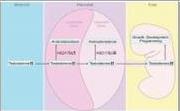Advertisment
How a low-protein diet predisposes offspring to adulthood hypertension
Studies have shown that the offspring of mothers on a low-protein diet are more likely to develop hypertension as adults.
Now, Drs. Gao, Yallampalli, and Yallampalli of the University of Texas Medical Branch at Galveston report that in rats, the high maternal testosterone levels associated with a low-protein diet are caused by reduced activity of an enzyme that inactivates testosterone, allowing more testosterone to reach the foetus and increase the offspring’s susceptibility to adulthood hypertension.
Foetal programming is a term used to describe the impact of maternal stress on an unborn child’s physical characteristics at birth, as well as its long-term health. The placenta is thought to be a major contributor to foetal programming due to its critical roles in hormone production and nutrient transport, as well as its susceptibility to environmental disruptions.
Recently, a study found that protein restriction doubles the plasma testosterone levels in pregnant rats. Elevated testosterone levels are associated with pregnancy-related complications such as preeclampsia and polycystic ovarian syndrome in humans, and emerging evidence suggests that testosterone may play a role in foetal programming of hypertension.
Gao et al. hypothesized that the increased testosterone levels were caused either by increased activity of an enzyme that produces testosterone or by decreased activity of an enzyme that reduces testosterone, specifically Hsd17b2, which converts testosterone to a less potent androgen, androstenedione.
The team found that Hsd17b2 expression in rats was affected by protein restriction in two parts of the placenta. It was increased in the junctional zone, which is responsible for hormone production, but was reduced in the labyrinth zone, which is essential for nutrient transport from mother to foetus and also acts as a protective barrier.
Based on this novel finding, Gao et al. propose that the reduction in Hsd17b2 expression in the protective labyrinth zone may allow more testosterone to reach the foetus and play a role in foetal programming of hypertension.
The finding that Hsd17b2 was the only enzyme for testosterone production affected by gestational protein restriction suggests an important role for Hsd17b2 in regulating the testosterone levels at the maternal-foetal interface; further research is needed to determine its exact functions.
Reference: Biology of Reproduction, published by the Society for the Study of Reproduction, is a top-rated peer-reviewed research journal in the field of reproductive biology.
Gao H, Yallampalli U, Yallampalli C. Gestational protein restriction reduces expression of Hsd17b2 in rat placental labyrinth. Biol Reprod 2012; (in press). Published online ahead of print 18 July 2012; DOI 10.1095/biolreprod.112.100479
Contact: Raul Reyes rareyes@utmb.edu
 Testosterone in maternal plasma, demonstrating elevated levels in response to gestational protein restriction, is transported into placental zones, where part of the testosterone is inactivated by HSD17B2. The rest of… click here for further information.
Testosterone in maternal plasma, demonstrating elevated levels in response to gestational protein restriction, is transported into placental zones, where part of the testosterone is inactivated by HSD17B2. The rest of… click here for further information.






